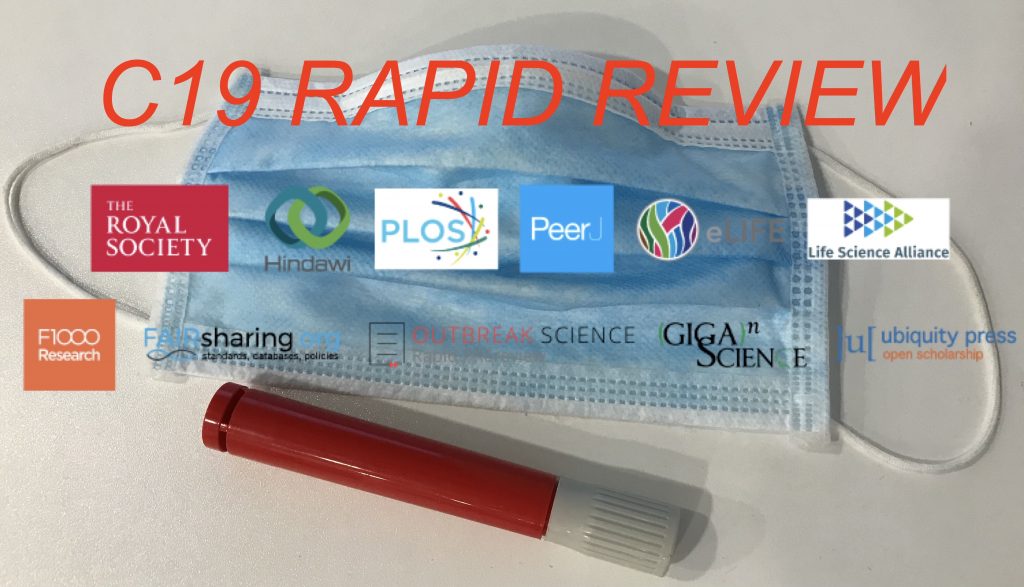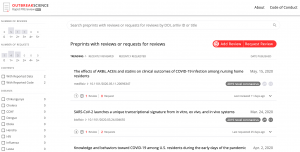GigaScience joins C19RapidReview: the COVID-19 Rapid Review Initiative

C19RapidReview: cross publisher collaboration against the coronavirus pandemic
The COVID-19 pandemic has created a new urgency to openly and rapidly share and review relevant research, with the world looking to science to solve the problems we currently face. While we’ve written about constructive things you can do while in lockdown, there are many more things you can’t do while locked out of the lab. And while dissemination and peer review of scientific research is needed more urgently than ever before, the challenges in filtering through this “infodemic” has stretched the normally slow, and labour intensive peer review system. As a large proportion of the global pool of the volunteer peer reviewers are stuck at home, trying to juggle childcare and other home-life challenges in these turbulent times, at the same time as carrying out their own day jobs. We hear of these challenges first hand while trying to carry out our peer review, and when receiving submissions directly relating to coronavirus research it is even harder to find relevant volunteers having time in their frantically pandemic-busting schedules to peer review.
 All journals are having the same problem, so it makes sense that they work together to try to find a way to streamline the process, removing inefficiencies to ease that burden. Which is an issue many in science have raised over the years but not managed to address, touching on the availability of research content and data, portable and more dedicated peer reviewer pools, as well as better cross-publisher collaboration. At GigaScience we mandate open peer review, open data and open access, promoting and integrating with pre-print servers and have also experimented with portable review (see our preprint.space collaboration), but these efforts have not been coordinated systematically with other publishers. Other than on a less cross-disciplinary and smaller scale by the Neuroscience Peer Review Consortium (NPRC), of which we are a participating journal.
All journals are having the same problem, so it makes sense that they work together to try to find a way to streamline the process, removing inefficiencies to ease that burden. Which is an issue many in science have raised over the years but not managed to address, touching on the availability of research content and data, portable and more dedicated peer reviewer pools, as well as better cross-publisher collaboration. At GigaScience we mandate open peer review, open data and open access, promoting and integrating with pre-print servers and have also experimented with portable review (see our preprint.space collaboration), but these efforts have not been coordinated systematically with other publishers. Other than on a less cross-disciplinary and smaller scale by the Neuroscience Peer Review Consortium (NPRC), of which we are a participating journal.
The urgency of this crisis has finally got these efforts off the ground, creating of new alliances and cross-publisher initiatives that would previously have been unheard of. Initially spurred and facilitated by Wellcome Trust and WHO initiatives promoting open access to COVID-19 papers and data it is encouraging to finally these efforts to finally take off. Particularly by a group of publishers and scholarly communications organizations through OASPA, the Open Access Scholarly Publishers Association, of which as an Open Access journal we’ve been members and presented at a few of their conferences (see our talk at their 2012 meeting). Participants in what is being called the C19RapidReview initiative includes eLife, Hindawi, PeerJ, PLOS, Royal Society, F1000 Research, Ubiquity Press, Life Science Alliance, FAIRsharing, Outbreak Science PREreview, and ourselves — are working on initiatives and standards to speed up the review process while ensuring rigor and reproducibility remain paramount. The group has issued an Open Letter of Intent and has launched an initiative to ensure a rapid, efficient, yet responsible review of COVID-19 content.
On top of all the participating publishers joining us in making articles and supporting data open (with mandatory data availability statements that we’ve been using since our launch in 2012), what hasn’t been done before is the initiatives combining efforts on peer review. The initiative is asking for volunteer reviewers with suitable expertise relevant to COVID-19, from all career stages and disciplines, to add their names to a “rapid reviewer list“. If you’d like to join please sign up via this google form or CCC list. By doing so, these reviewers will be committing to rapid reviewing times, and upfront agreement that their reviews and identity can be shared among participating publishers and journals if submissions get rerouted for any reason.
The response has been global, with academics from over 85 countries already adding their names to the C19RapidReview list to speed up the review process while ensuring rigor and reproducibility remain paramount. And every one of these reviewers has committed to rapid turnaround times and that their reviews and identity can be shared among publishers and journals, if submissions get rerouted for any reason. We believe this will ensure relevant research is reviewed and published quickly and efficiently, and we’ve already found very helpful input using this resource with some of our COVID-19 related submissions.

COVID-19 preprints in Outbreak Science Rapid PREreview.
On top of pooling peer review efforts, the initiative calls on volunteer reviewers to identify and highlight important and crucial COVID-19 preprints to optimise the limited time of expert reviewers who are subsequently invited to review the most important and promising research by a journal/platform. This is challenging when there are already >4000 COVID-19 preprints in bioRxiv and medRxiv but platforms such as Outbreak Science Rapid PREreview provide an open and transparent forum to do this, and we and other participating journals will consider comments on preprints during the journal peer-review process. To aid this the initiative calls on authors to support reviewers and publishers in this endeavor by ensuring the deposition of their submission as a preprint, and by working with publishers to make the peer-reviewed article and associated dataset, software, and models available for reuse as rapidly as possible.
The mention on data and code is a welcome addition to this effort, and participants are aiming to facilitate the stewardship of FAIR data and software code sharing underlying these papers and preprints by working with FAIRsharing, the Research Data Alliance and Force11 via the joint RDA/Force11 FAIRsharing Working Group. Organizations we again have a long history of collaborating with and participating in working groups. See the FAIRsharing COVID-19 collection for a curated list of useful data resources.
Please contact us and the other C19RapidReview members if you have COVID-19 related research you would are interested in submitting, and if you have the skills and expertise to help we would encourage you to sign up to the reviewer list, and provide feedback on the latest preprints. And keep promoting and supporting these efforts to work together in more open, and sustainable ways.